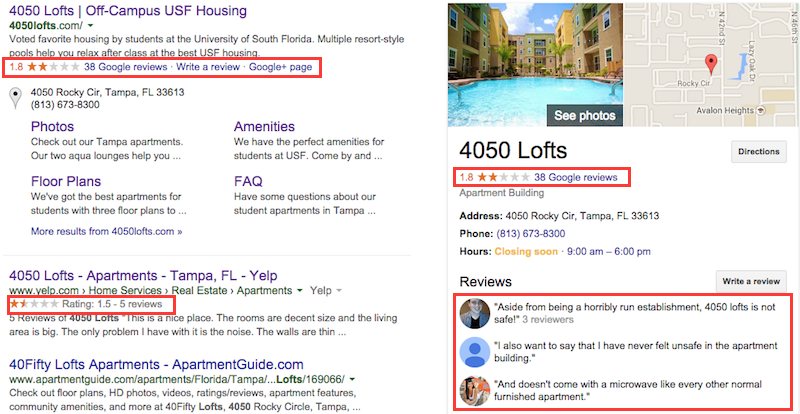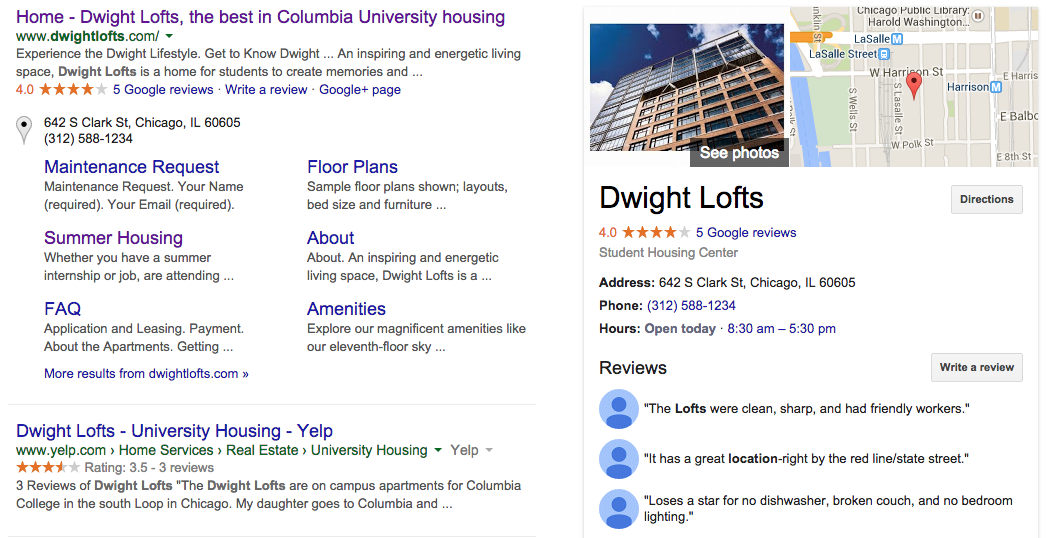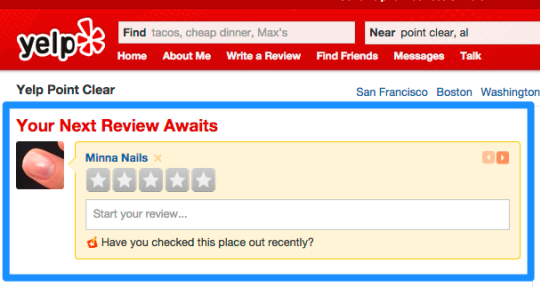Reviews matter for more than just reputation — start cultivating them now.
Windermere Cay, an apartment complex in Florida, recently set out to discourage bad reviews with a new policy: anyone who posts bad reviews on social media will be charged a $10,000 fine. As you can expect, this didn’t go over so well. It is fair to say the negative PR and subsequent onslaught of extremely negative reviews have since destroyed the establishment’s reputation. Read the entire addendum here.
So how do you cultivate good reviews without coming off as pushy or labeled as spam? In a recent article from Search Engine Journal, it was reported that 88 percent of customers trust online reviews as much as personal recommendations. This is extremely important for businesses, but the impact of negative reviews can be further reaching than that.
Google cares, too
Below is the search engine results page (SERP) for “4050 Lofts”, showing low ratings on both Google and Yelp. For SEO, this is extremely discouraging. At Catalyst, we work to acquire rankings for non-branded keywords, knowing that branded keywords will rank on their own. However, ranking doesn’t matter much if the prospect immediately gets such a bad impression that they don’t even visit the website. Social proof has a powerful impact on consumer decisions. If the prospects think that most people have a bad view of your business, they’ll likely believe the same thing.

The Google SERP is now a customer’s first impression of your business. Make sure it looks great. Take a look at “Dwight Lofts” below. Even though one bad review is showing, the overall image of the property gives a definitively positive vibe. In addition, good reviews are currently a known ranking factor for local SEO. This means that a business could be missing out on valuable rankings for non-branded keywords by simply having a bad Google+ rating.

4 simple tips to cultivating good reviews
Here are four definitive tips that will help you get good reviews. Understand that good reviews don’t happen overnight. In fact, dramatic changes like this can get you hit with a spam penalty. Use these practices over time to cultivate one or two good reviews each quarter, and in time, you’ll start seeing the benefits.
1. Absolutely killer customer service.
This is the simplest means of garnering good reviews, but perhaps the most difficult. Make sure that every customer that comes in the door feels like you are worth a good review. And if that customer feels inclined to give a good review, make sure that it’s easy for them to do. Write directions on a business card to hand out or include a direct link on your website. Whatever you do, break down as many barriers between the good experience and submitting a review.
2. Give people an offer, and they’ll return the favor.
Greg Sterling recently posted an article on Marketing Land with a creative technique for cultivating good reviews: incentivized check-ins. Yelp has featured check-in offers since around 2010. A person who visits the business can check-in to receive a special promotion. In addition to offering incentives to visit the business, check-in offers also promote good reviews. After accepting a check-in offer, Yelp users are prompted to review the business the next time they open the app (see the image below from Sterling’s article). If this type of offer works for your business, use it to encourage sales as well as reviews.

3. Asking for Google, not for Yelp.
Yelp has been very clear about their policy regarding asking people to review the business: Don’t do it. However, Google has been open to asking for reviews. Use this to your advantage! SEO ranking factors are based on both Google and Yelp reviews, but Google reviews will show up much more prominently on the SERP. Of course, this doesn’t mean hounding your customers or sending out an email to your list requesting a review. Instead, when someone has had a good experience, request they write a customer review. Maybe even send out a customer survey to get an idea of who has had a good experience and follow up with them about what made their experience so good. And once again, make it as easy as possible for them to translate that good experience into a good review.
4. Put it on everything.
Finally, reviews should be an integral part of all of your marketing/promotion efforts. If you send out an email, include a Yelp link with your social media. Nearly everyone has a Google account these days. You can easily create a direct link to your Google+ reviews page that features a large “Write a Review” button at the top. Check out this article for instructions. Include a link to this on your website so visitors can immediately write a public review.
Remember, keeping it simple for your business and your customers is your best means of getting those good reviews. Give people a reason to like you and an easy means to tell the world.

